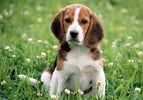
How to Keep Dogs Safe in the Summer Months
By Katrina Walker

By Katrina Walker
Dogs enjoy playing outside in all weather, but they’re far more likely to spend increased time outdoors during the summer months, especially as owners will want to enjoy the sunshine with them. Now that it’s officially summertime, here are our top tips for caring for dogs in the hot weather.
1. Never leave dogs in hot cars
This is the number one golden rule! The temperature inside of a car that has been left in direct sunlight raises incredibly quickly, and dogs will similarly dehydrate and overheat in a hot car just as quickly. Therefore, it is advisable to always take your dog with you when you get out of the car, or leave someone with them who can open the windows and provide them with drinking water.
2. Provide shade
Just like humans, dogs can get badly sunburned on their skin, particularly short-haired breeds and dogs with a shaved or trimmed down coat. Look into using dog-specific sun cream to give them some protection, as the versions that are available for humans may not have the same effect. Providing access to plenty of shade is vital for giving your pet some respite from the sun, as well as somewhere cool to relax after running around.
3. Always take plenty of water
When out and about be sure to take more fresh water than you think you’ll need, just in case you are unable to stop or refill their water supply. Allowing your dog to drink from local bodies of water (lakes or rivers) is not the same as giving them fresh water. Drinking from lakes and rivers can potentially make them more thirsty in the process.
4. Try to avoid hot concrete and asphalt
Walking dogs in hot weather should be limited to the early morning and evenings where possible, to ensure that the heat is not at its peak. Limit time spent walking your dog on hot concrete or asphalt where you can, as it could quickly burn their sensitive paws. Instead, spend more time on grass, cool sand, or in the shade. Check your pet’s paws for discoloration, cuts, or bruises regularly. If you discover that they have burnt their paws, make sure you disinfect them and add a cooling ointment. Speak to your local vet to check which ones are pet-friendly.
5. Groom regularly
Keeping your dog’s fur and nails trimmed during the summer is another easy way to stop them from overheating. Regular brushing will help them to shed their winter coat, and keeping their nails trimmed is a great way of prevent torn nails, which can become infected. If your dog has very thick hair, consider taking them to a professional groomer to have its coat trimmed. This will help to keep them cool and will make it easier for you to keep groomed throughout the rest of the summer.
6. Go to summer fireworks displays alone
Fireworks are common during live summer events, carnivals, and other community gatherings. Noise, crowds, and flashing lights are all things that can cause your dog to become disorientated and stressed. If you are planning to go to a fireworks display this summer, leave your dog at home where they can feel safe, preferably arranging for someone to stay with them.
7. Recognize heat stress
If ignored, heatstroke can be fatal to our pets. Signs of heat stress can include heavy panting or difficulty breathing, an increased heart rate, excessive drooling, stupor, mild weakness, or even collapse. If you see any of these symptoms in your dog or if they appear to be behaving unusually, take a break in the shade with some cool water. If you can, use cool wet towels to help your dog to calm down. Do not dunk them into a pool of water, as this could cause them to go into shock. If these symptoms continue, call your vet as soon as possible.
8. Avoid fertilizers and garden treatments
Some fertilizers and garden treatments contain chemicals that can be harmful to pets, so if you’re currently preparing your lawn for the summer months, be sure to ask your vet for advice on which products are safe to use. You should always keep bottles of chemicals, fertilizers, and other treatments out of reach of pets and children, cleaning up any spillages immediately.
9. Avoid feeding your dog picnic food
Picnics are fun family events, so we often take our dogs along. It can be tempting to feed our dogs food from the picnic buffet, but this can be a bad idea. Picnic foods are often loaded with sugar and can be detrimental to the health of your dog. It can lead to upset tummies and can cause them to put on weight quite quickly. As much as they may look at you with their puppy dog eyes, resist the temptation to share your food, it will only be bad for them in the long run.
10. Keep on top of flea and tick treatments
Spending more time outside in the summer can mean more time spent in long grass or with other animals. This can often lead to the spread of fleas or ticks, so prevention is the best idea. Routinely treat your dogs with the recommended doses of flea and tick preventative as recommended by your vet to ensure that your pet and home are kept free from pests.
Our site uses cookies. By clicking on accept you agree with our voorwaarden and privacy policy.